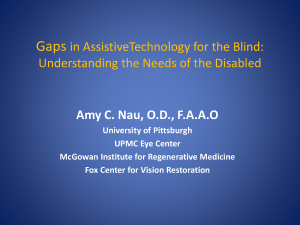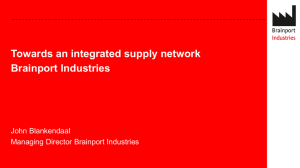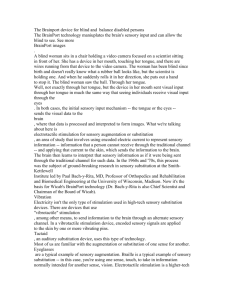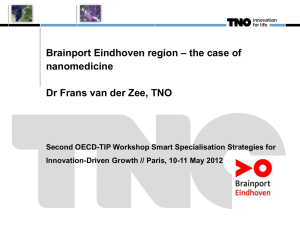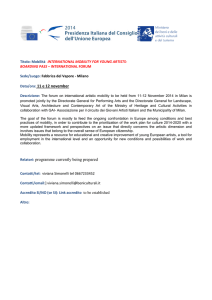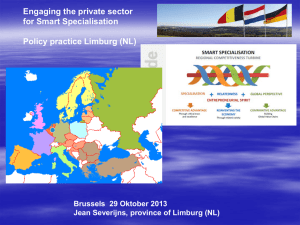BrainPort ® Vision Device: Updates Marshall Flax 1 , Aimee
advertisement
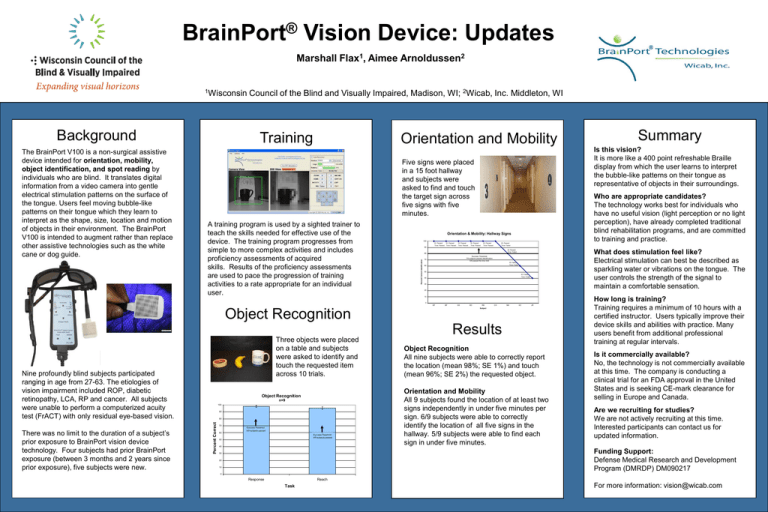
BrainPort® Vision Device: Updates Marshall Flax1, Aimee Arnoldussen2 1Wisconsin Background Training Orientation and Mobility A training program is used by a sighted trainer to teach the skills needed for effective use of the device. The training program progresses from simple to more complex activities and includes proficiency assessments of acquired skills. Results of the proficiency assessments are used to pace the progression of training activities to a rate appropriate for an individual user. Who are appropriate candidates? The technology works best for individuals who have no useful vision (light perception or no light perception), have already completed traditional blind rehabilitation programs, and are committed to training and practice. Orientation & Mobility: Hallway Signs 100 ID: Passed Time: Passed ID: Passed Time: Passed ID: Passed Time: Passed ID: Passed Time: Passed ID: Passed Time: Passed ID: Passed Time: Failed 90 What does stimulation feel like? Electrical stimulation can best be described as sparkling water or vibrations on the tongue. The user controls the strength of the signal to maintain a comfortable sensation. ID: Passed Time: Failed 80 Success Threshold 7/9 subjects passed identification 5/9 passed the time limit 70 ID: Failed Time: Failed 60 50 ID: Failed Time: Failed 40 30 20 10 0 KP Object Recognition Three objects were placed on a table and subjects were asked to identify and touch the requested item across 10 trials. Nine profoundly blind subjects participated ranging in age from 27-63. The etiologies of vision impairment included ROP, diabetic retinopathy, LCA, RP and cancer. All subjects were unable to perform a computerized acuity test (FrACT) with only residual eye-based vision. n=9 100 90 80 Percent Correct There was no limit to the duration of a subject’s prior exposure to BrainPort vision device technology. Four subjects had prior BrainPort exposure (between 3 months and 2 years since prior exposure), five subjects were new. Object Recognition 70 Success Threshold 9/9 subjects passed 60 Success Threshold 9/9 subjects passed 50 40 Summary Is this vision? It is more like a 400 point refreshable Braille display from which the user learns to interpret the bubble-like patterns on their tongue as representative of objects in their surroundings. Five signs were placed in a 15 foot hallway and subjects were asked to find and touch the target sign across five signs with five minutes. Percent Correct Identification The BrainPort V100 is a non-surgical assistive device intended for orientation, mobility, object identification, and spot reading by individuals who are blind. It translates digital information from a video camera into gentle electrical stimulation patterns on the surface of the tongue. Users feel moving bubble-like patterns on their tongue which they learn to interpret as the shape, size, location and motion of objects in their environment. The BrainPort V100 is intended to augment rather than replace other assistive technologies such as the white cane or dog guide. Council of the Blind and Visually Impaired, Madison, WI; 2Wicab, Inc. Middleton, WI BF GS KD RB CH SM KC JR Subject Results Object Recognition All nine subjects were able to correctly report the location (mean 98%; SE 1%) and touch (mean 96%; SE 2%) the requested object. Orientation and Mobility All 9 subjects found the location of at least two signs independently in under five minutes per sign. 6/9 subjects were able to correctly identify the location of all five signs in the hallway. 5/9 subjects were able to find each sign in under five minutes. How long is training? Training requires a minimum of 10 hours with a certified instructor. Users typically improve their device skills and abilities with practice. Many users benefit from additional professional training at regular intervals. Is it commercially available? No, the technology is not commercially available at this time. The company is conducting a clinical trial for an FDA approval in the United States and is seeking CE-mark clearance for selling in Europe and Canada. Are we recruiting for studies? We are not actively recruiting at this time. Interested participants can contact us for updated information. Funding Support: Defense Medical Research and Development Program (DMRDP) DM090217 30 20 10 0 Response Reach Task For more information: vision@wicab.com
